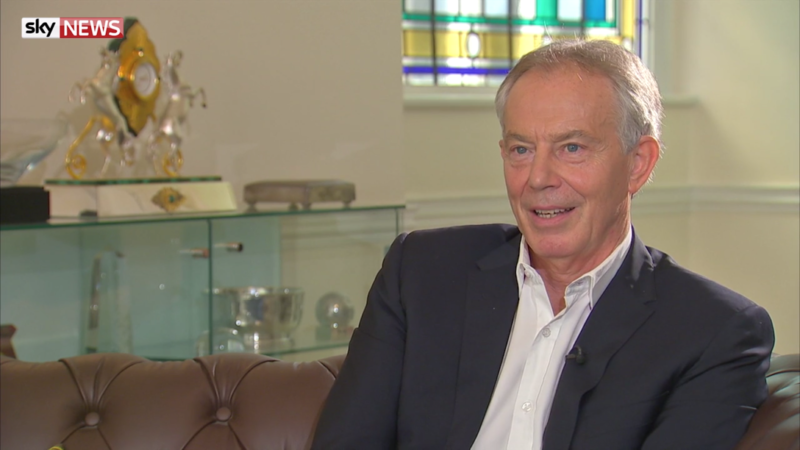

This is the full essay published by Tony Blair on his institute’s website this weekend as a foreword to Technology for the Many: A public policy platform for a better, fairer future, a new pamphlet by Chris Yiu.
The chief characteristic of today’s world is the scope, scale and speed of change; especially technological change.
Everybody knows this. We experience it in our daily lives. It is changing the way we live, whether at home, at leisure, at work or play, and in our social and political interactions. It touches everything.
The first political party to master the implications of this revolution, to understand its risks and opportunities and crystallise such understanding into policy, should own the foreseeable political future.
Yet those changing the world through tech, and public policy makers trying to construct policy in response to it, are often planets apart, with little structured dialogue and increasing levels of hostility.
It is in everyone’s interests to fix this.
The challenge politically is that the populism of both left and right sweeping Western politics, sees technology as more of a threat than an opportunity, part of what they regard as an uncontrolled and unthinking embrace of globalisation.
Both are coming to the view that globalisation is a net negative whose excesses outweigh its advantages.
They couch their language differently, but essentially both represent the politics of fearfulness about the future.
The risk is either that we try and resist technological change or that we fail to access its vast opportunities.
The force behind globalisation ultimately is people – they’re the ones using the technology, doing the trade and travel, and engaged in migration.
Governments can delay it, upset it, interfere with it, but the direction of the world is clear and even if Western nations were to turn their back on these changes, the rapidly developing rest of the world will not, as in different ways China and India are making plain.
AI will arrive; driverless cars and trucks are happening; so are ground-breaking developments in medical science; big data is already transforming industries and the service sector; 3D manufacturing is upon us.
All of it will intensify.
So obviously the sensible course is to match the revolution in change with a revolution in public policy.
But in Britain today, we are nowhere near such a juncture in policy. On the contrary, in respect of the government, what impetus there was behind British tech policy in the days of Cameron and Osborne, including the launch of the Government Digital Service, has faded; and the Labour Party programme, despite a significant number of MPs who know we need a progressive answer to the tech revolution, largely ignores the potential for change in public services and has the feel of old style industrial strategy from the 1960s.
To be fair, both party programmes develop similar themes around the need for national broadband infrastructure and help for the tech sector.
But either would feel quite familiar to my government circa 2007; and yet in the 10 years since then, the change has been so dramatic and is accelerating so fast that neither seems remotely adequate to the challenge now.
The goal of my Institute is to provide a policy programme for those in whatever Party who want policies which are radical because they meet the scale of the challenge; but sensible because they’re geared to a realistic assessment of way the future works.
Chris Yiu – the author of the paper – is one of a number of policy people who are working in the Institute under Yascha Mounk to create this policy platform.
Over the coming months, we will put forward further papers on issues such as housing, immigration, infrastructure, tax and spending as well as what we already produce in the fields of aid and development and co-existence and the fight against extremism.
Chris puts forward a number of policy ideas including: funding education and training upfront for those who want to gain new skills, with a repayment system based on ability to pay; putting in place a fast internet infrastructure network with universal coverage; a programme for the digitalisation of British industry similar to that already underway in Germany; incorporation of tech driven efficiencies across public services; use of tech to change the way Britain is taxed and infrastructure is used; specific measures to improve our AI development; and changes in the way government works, including an individual personal account manager for each citizen; a secure personal digital identity; and a Department for Digital and Technology, staffed and run differently from conventional government.
He also argues that the power of the modern tech titans means they cannot operate without a new form of public interest regulation.
It is a comprehensive programme. It is designed to stimulate debate. And most of all it aims to change our way of thinking about tech from incremental to revolutionary.
It is of course exactly what we should be focusing upon as a country, rather than Brexit. The opportunity cost of Brexit is immense and I remain deeply sceptical that it is possible in the realities of governing, for the prime minister and government to do much of anything other than Brexit so great is its complexity.
However, I would also say that if Brexit does go ahead, the agenda outlined here is of paramount importance. If we are to build our future outside the European Union, then becoming world leaders in this space will be imperative.
So Brexit or no Brexit this subject is of vast significance.
Traditional categories of Right and Left have no particular meaning in this context.
What matters is to move the slow and byzantine processes of government to accommodate the necessary response to a wave of change which, if ridden with intelligence, can carry us to a bright future but which if let pass will maroon us in a sea of irrelevance and decline.
Such policy change is the only way to defeat populism. Unless we show people that there is an optimistic path to the future, that the changes offer more opportunities than threats, the politics of hope will never be re-kindled.
This paper seeks to start a necessary national debate about how we do this.
Tony Blair is executive chairman of the Institute for Global Change.




More from LabourList
Turning the page? Labour’s recovery in the polls show a path to 2029 victory
Restoration announce recommendations for NEC candidates
‘Factionalism at the top is weakening Labour – and handing a gift to Reform’